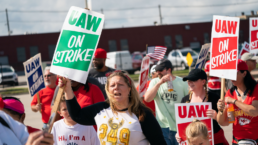The United Auto Workers, headed by a new reform leadership, are set to strike the Big Three automakers at midnight tonight. The entire working class will be watching to see if autoworkers can claw back decades of concessions and win a transformative contract.
By Alex N. Press, Jacobin
Walter Reuther, the most well-known president of the United Auto Workers (UAW), was fond of calling the union the “vanguard” of the labor movement. Reuther was no Leninist — it is no secret that he ruthlessly fought radicals inside the union — but it was a nod to the outsize power the UAW had in setting the standard for the US working class. Reuther had relationships with social movement leaders, particularly in the civil rights movement, and he wielded broad power to sustain the union’s pacesetting role.

Today’s UAW is far diminished from Reuther’s era. The membership has shrunk as technology has been deployed to reduce labor costs and outsourcing has been used to shed jobs in the country’s auto plants. A minority of the nation’s autoworkers are now UAW members.
That’s a lot of ground to make up, but the union, spurred by new reform leadership elected in the first direct elections in the union’s history, is dead set on trying. At midnight, for the first time in history, the UAW may strike all of the Big Three automakers — Ford, General Motors (GM), and Stellantis — should the companies fail to come up with acceptable counteroffers to the union’s key proposals for the four-year contracts that cover some 150,000 workers.
The companies have raked in roughly a quarter of a trillion dollars in profits in North America over the past decade; those profits have soared 65 percent over the past four years alone. Their CEOs have been handsomely rewarded for such success, with their pay rising 40 percent over the same period, even as workers’ real wages have declined 30 percent.
Recent Posts
These Veterans Starved Themselves To Protest The War In Gaza
July 8, 2025
Take Action Now As food in Gaza becomes increasingly scarce, activists are pushing their bodies to the limit in solidarity.By Emmet Fraizer, The…
ICE Agents Are Terrorizing Los Angeles With Brutal Tactics
July 8, 2025
Take Action Now ICE agents have established a pattern of brutal use of force in immigration raids.By Jonah Valdez, The InterceptSince June 6,…
Talk World Radio: India Walton On Zohran Mamdani And Freezing Out ICE
July 7, 2025
Take Action Now India Walton, former Democrat nominee for mayor of Buffalo, NY, discusses Zohran Mamdani and the race for NYC mayor and how to deal…
How Climate Change Is Worsening Flooding And Heavy Rainfall
July 7, 2025
Take Action Now The latest science on the link between climate change and natural disasters — and how they may be playing out where you live.By…




